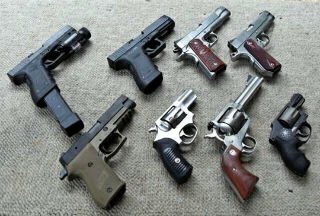Lyle Denniston, the National Constitution Center’s Supreme Court correspondent, looks at a potentially significant federal court decision about gun ownership that could be heading to the Supreme Court.

A file photo of different makes of handguns from six different manufacturers.
Courtesy Gun News Daily via Chris Browning.
For the first time, a federal appeals court has ruled that it is unconstitutional, at least in non-violent cases, to automatically take away an individual’s Second Amendment right to have a gun after being convicted of a crime that the law treats as serious.
If an individual’s actual crime did not involve violence, a federal law that ends gun rights is unconstitutional in that specific case, even if the crime qualifies as a felony, the U.S. Court of Appeals for the Third Circuit ruled last week in a widely splintered 8-to-7 decision.
Although some other federal appeals courts have said they might take that approach, none has done so to actually restore an individual’s Second Amendment right to possess a gun for personal use. There is a deep split among courts at that level, so the issue may well be on its way to the Supreme Court, perhaps in the Third Circuit case, named Binderup v. U.S. Attorney General.
In the new ruling, a 174-page decision issued last Wednesday, the majority of eight judges blocked the enforcement of one of the most significant federal gun control laws in cases involving two Pennsylvania men who have stayed out of trouble for years after being convicted of crimes that normally would mean they had to forfeit their Second Amendment right.
A combination of two blocs of judges, one of three and the other of five, applied different constitutional tests as they agreed that the federal felon-in-possession law cannot be applied to the two Pennsylvanians, even though their crimes did fall directly under that law.
The federal government had argued unsuccessfully that the law is clear in its scope, and courts cannot exempt individuals from it based on the facts and circumstances of a given case. The Justice Department had appealed the case to the Third Circuit Court after a federal trial judge ruled in favor of the two men’s challenge.
The law at issue provides that gun rights are to be forfeited when an individual is convicted of a crime that can lead to a prison sentence of more than a year in prison – the usual definition for a felony, or serious crime. There are some exceptions: gun rights are not lost if the conviction was of a state misdemeanor and the potential sentence was up to two years, and it allows for restoration of gun rights if a person’s conviction has been nullified or that individual has been pardoned.
In the Third Circuit case, the 15-judge court ruled unanimously that the two men’s situations were covered by the law, because each was convicted of crimes that could have led to five years in prison for Daniel Binderup and to three years in prison for Julio Suarez. Binderup’s conviction came in 1996 for corrupting a minor girl, and Suarez’s came in 1990 for having a handgun without a license. Neither actually got prison time when sentenced, but their crimes – because of the potential prison term – meant they would lose their gun rights.
Both sued, claiming their situations were not covered by the law and, if they were, the automatic loss of their gun rights violated the Second Amendment.
The Third Circuit Court’s ruling dealt with the case not as a direct constitutional challenge to the felon-in-possession law in all circumstances (that is, it was not what lawyers call a “facial challenge”), but only as it was applied to their specific circumstances. (The Supreme Court, in the eight years since first recognizing a personal right under the Second Amendment to have a gun, has never ruled on such an “as-applied” challenge, so lower courts so far have no binding guidance on it.)
The bloc of three judges in the majority declared the law unconstitutional when used against Binderup and Suarez even though they were in the class of those who would ordinarily lose their gun rights, because their crimes did not involve violence, the facts did not show the crimes were actually serious in a conventional legal sense, and the two men had lived for years as “virtuous citizens.”
A separate bloc of five judges in the majority argued that the “virtuous citizen” approach was too imprecise, so these judges went further. They declared the federal law unconstitutional when used against anyone who could come to court with a convincing argument that their crime did not involve violence or any other signs that it was a serious offense. The Second Amendment right is too valuable to take it away in such a case, those judges wrote.
Seven judges dissented, arguing that they would never allow an “as-applied” challenge to the law that forfeits gun rights for those crimes that are covered by its provisions. The two men in this case, the dissenters said, “ask us to do something that no federal appellate court has done before: to hold that, even though they were both convicted of crimes punishable by multiple years in prison, Congress may not constitutionally prevent them from owning firearms.”
The dissent noted that there has been “a long tradition in this country of preventing criminals from owning guns,” and the law taking away Second Amendment rights from such criminals “has been in force for over half a century.”
The ruling was issued by the Third Circuit Court sitting “en banc,” so any government appeal of the decision would go next to the Supreme Court.
Legendary journalist Lyle Denniston is Constitution Daily’s Supreme Court correspondent. Denniston has written for us as a contributor since June 2011. Denniston has covered the Supreme Court since 1958. His work also appears on lyldenlawnews.com.






